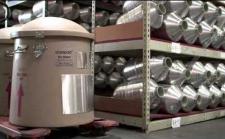Inside the Hidden Global Supply Chain for Frozen Sperm, Eggs, and Embryos
By Sarah Zhang,
WIRED
| 04. 25. 2016
Untitled Document
In a world with porous borders and wildly divergent surrogacy laws, making a baby can be a global affair: The eggs might come from a woman in South Africa, the sperm from a man in Canada, and the surrogate herself might be in Cambodia. What connects them, literally, is a cold chain.
Typical cold chains—made up of refrigerated trucks and shipping containers—bring us perfectly preserved bananas from Central America, seafood from Asia, and vaccines from Europe. But it takes a specialized cold chain to transport finicky eggs, sperm, and embryos across the world for surrogacy via in vitro fertilization. To expectant parents, that material is more precious any other possible cargo. And they’re willing to pay. A lot.
Continue reading on WIRED...
Image via Cyroport
Related Articles
By Ava Kofman, The New Yorker | 02.09.2026
1. The Surrogates
In the delicate jargon of the fertility industry, a woman who carries a child for someone else is said to be going on a “journey.” Kayla Elliott began hers in February, 2024, not long after she posted...
By Alex Polyakov, The Conversation | 02.09.2026
Prospective parents are being marketed genetic tests that claim to predict which IVF embryo will grow into the tallest, smartest or healthiest child.
But these tests cannot deliver what they promise. The benefits are likely minimal, while the risks to...
By Pei-Chieh Hsu, Taiwan Insight | 02.02.2026
By Diaa Hadid and Shweta Desai, NPR | 01.29.2026
MUMBRA, India — The afternoon sun shines on the woman in a commuter-town café, highlighting her almond-shaped eyes and pale skin, a look often sought after by couples who need an egg to have a baby.
"I have good eggs,"...




